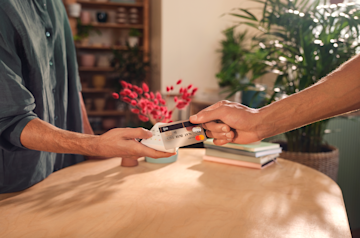
N26 x Finanzfreundinnen: how to kickstart building wealth
When it comes to investments, sometimes the first step is the hardest. We talk with Magdalena Mirbach of Finanzfreundinnen about how women can start growing their wealth and why it’s so important.
6 min read
Pension funds, ETFs, crypto — when it comes to investments, sometimes the first step is the hardest. Getting started with building wealth is daunting, but according to Magdalena Mirbach, the founder of Finanzfreundinnen, the most important thing is to simply start. This is especially true for women, since old-age poverty continues to affect women more often than men. In this interview, Magdalena shares the investment mistakes she made when she was starting out and her thoughts on crypto investments. She also talks about the first steps to wealth-building and how you can find an investment strategy that works for you. Enjoy our chat with Magdalena!
How did you come up with the idea of Finanzfreundinnen?We founded Finanzfreundinnen with the goal to give women better access to information about investments and the stock market, and to show that everyone has the opportunity to become more financially independent. The trading floor has been traditionally considered a male domain, and it hasn’t been easy for women investors to enter the scene. At the same time, women still receive 57% less in pension funds than their male counterparts. So, we thought that it’s time for things to change — and we founded Finanzfreundinnen. Did you make investment mistakes in the beginning?Of course! Most people aren’t professionals when they first start out, and it’s more important to get started in the first place. It’s totally normal to make a few mistakes along the way — you learn from them. For example, I had a favorite stock (becoming emotionally attached is the first mistake) and then got greedy (second mistake). Instead of securing the profits when I hit my original investment goal, I let things get out of hand. In your opinion, what are the first things to do before entering the stock market?You should start by getting an overview of how the stock market works, which types of investment there are, what your appetite for risk is, and what the investment horizon is that you’re aiming at. Do you want to make a long-term investment, with low risk and little action required on the way? Then you need to choose different options than people who are “gamblers” and take more risks — they might follow a short-term strategy that could yield higher returns. Once you’ve found your personal investment strategy, you should learn more about the different brokers and which one fits your needs. Then you should define the criteria that are important to you when choosing stocks, ETFs, etc. For instance, do you only want to invest in companies that are sustainable? Also, remember to never put all your eggs in one basket, since diversification is essential to a solid wealth-building strategy. You educate a lot about pension plans and the pension gap. When do you think the best time is to start a pension?As soon as possible! With every year you keep waiting, you miss out on potential returns. One of the false assumptions people have about investing is that you need a lot of money before you can start. However, this isn’t true — there are ETF savings plans that require as little as €25 per month. To better understand why it’s so important to start as early as possible, consider the following example: At age 25, Anne starts investing €50 per month in the MSCI World ETF (with a supposed rate of return of 7.7% p.a.). When she turns 50, her assets would be worth €44,007. Bianca follows the same strategy but starts at age 35, and therefore would have “only” €16,681 when she turns 50. Don’t be discouraged if you’re a late bloomer, though — it’s more important to get going and take your first steps!People can choose to invest in resources such as gold as well as real estate, stocks, crypto, and much more. Which types of investments and investment strategies are good to know about?There is no hard rule for that because different investment types are basically a matter of personal taste. As a general rule, never invest in companies or asset classes you don’t understand! It’s really important to have a broad mix, which means diversifying your investments. This way, you can spread out the risk and reduce potential losses if a particular asset class (or stock) isn’t performing well. Which types of investments you want to add to your portfolio is really up to you.Why, in your opinion, are women less open to cryptocurrencies than men?Not only is cryptocurrency a relatively new topic, it’s also pretty complex if you really want to get the hang of it. As a beginner, you should first learn the basics of “classical” stock investments and then slowly move on to other asset classes such as cryptocurrencies. There are also a lot of scammers in the crypto world (and not just in crypto). Women are generally more careful when handling their money, while men tend to take more risks. However, cryptocurrency is a very interesting topic and it’s definitely worthwhile to dig in deeper.Cryptocurrencies are exciting, but they’re also a complex subject. Do you invest in cryptocurrencies yourself? Yes, a few of us have invested in cryptocurrencies. In 2017, when I started learning more about it, I only invested “play money” — small amounts of money I wouldn’t miss if it were lost. Investing in crypto is very different from investing in the stock market, so it was important to me to first understand how everything works. You can also invest in FinTechs or companies related to blockchain technology and similar topics, or even crypto ETFs in order to participate in the market. How can women figure out an investment strategy that really works for them?First, understand what you’re trying to achieve: Do you want to close the pension gap when you retire? Do you want to build a financial cushion for your dreams, e.g. traveling the world when you’re older? Do you want to make sure the funds in your bank account won’t decrease in value due to inflation, etc.? Also try to understand which asset classes and industries you’re interested in and what your exclusion criteria are. Once you’re clear about your goals and questions, you can create a solid investment portfolio to grow your wealth. What do you think banks like N26 could do to help women become more financially independent? We believe that a lot has changed in the past few years already. Platforms and other tools have become much more user-friendly and easier to use, and they offer lots of exciting features. Platforms created by women for women are still important, and they keep getting better! To us, it seems that, in recent years, women have become more active and learned more about financial topics. This is an amazing development that we’re very happy about, because it really pays off for people in the long term!
Disclaimer: Shares, ETFs and funds referred to in the article are always subject to risks. Information provided in the article does not constitute any form of investment advice or recommendation to buy or sell securities or other financial instruments. All information provided is for educational and illustrative purposes only and represents exclusively the opinion of the author. None of this information constitutes a recommendation for a particular investment strategy. No liability can be assumed for its correctness. Should the readers adopt the offered contents as their own, make use of any information or follow any opinion referred to in the article, they act at their own risk.
How did you come up with the idea of Finanzfreundinnen?We founded Finanzfreundinnen with the goal to give women better access to information about investments and the stock market, and to show that everyone has the opportunity to become more financially independent. The trading floor has been traditionally considered a male domain, and it hasn’t been easy for women investors to enter the scene. At the same time, women still receive 57% less in pension funds than their male counterparts. So, we thought that it’s time for things to change — and we founded Finanzfreundinnen. Did you make investment mistakes in the beginning?Of course! Most people aren’t professionals when they first start out, and it’s more important to get started in the first place. It’s totally normal to make a few mistakes along the way — you learn from them. For example, I had a favorite stock (becoming emotionally attached is the first mistake) and then got greedy (second mistake). Instead of securing the profits when I hit my original investment goal, I let things get out of hand. In your opinion, what are the first things to do before entering the stock market?You should start by getting an overview of how the stock market works, which types of investment there are, what your appetite for risk is, and what the investment horizon is that you’re aiming at. Do you want to make a long-term investment, with low risk and little action required on the way? Then you need to choose different options than people who are “gamblers” and take more risks — they might follow a short-term strategy that could yield higher returns. Once you’ve found your personal investment strategy, you should learn more about the different brokers and which one fits your needs. Then you should define the criteria that are important to you when choosing stocks, ETFs, etc. For instance, do you only want to invest in companies that are sustainable? Also, remember to never put all your eggs in one basket, since diversification is essential to a solid wealth-building strategy. You educate a lot about pension plans and the pension gap. When do you think the best time is to start a pension?As soon as possible! With every year you keep waiting, you miss out on potential returns. One of the false assumptions people have about investing is that you need a lot of money before you can start. However, this isn’t true — there are ETF savings plans that require as little as €25 per month. To better understand why it’s so important to start as early as possible, consider the following example: At age 25, Anne starts investing €50 per month in the MSCI World ETF (with a supposed rate of return of 7.7% p.a.). When she turns 50, her assets would be worth €44,007. Bianca follows the same strategy but starts at age 35, and therefore would have “only” €16,681 when she turns 50. Don’t be discouraged if you’re a late bloomer, though — it’s more important to get going and take your first steps!People can choose to invest in resources such as gold as well as real estate, stocks, crypto, and much more. Which types of investments and investment strategies are good to know about?There is no hard rule for that because different investment types are basically a matter of personal taste. As a general rule, never invest in companies or asset classes you don’t understand! It’s really important to have a broad mix, which means diversifying your investments. This way, you can spread out the risk and reduce potential losses if a particular asset class (or stock) isn’t performing well. Which types of investments you want to add to your portfolio is really up to you.Why, in your opinion, are women less open to cryptocurrencies than men?Not only is cryptocurrency a relatively new topic, it’s also pretty complex if you really want to get the hang of it. As a beginner, you should first learn the basics of “classical” stock investments and then slowly move on to other asset classes such as cryptocurrencies. There are also a lot of scammers in the crypto world (and not just in crypto). Women are generally more careful when handling their money, while men tend to take more risks. However, cryptocurrency is a very interesting topic and it’s definitely worthwhile to dig in deeper.Cryptocurrencies are exciting, but they’re also a complex subject. Do you invest in cryptocurrencies yourself? Yes, a few of us have invested in cryptocurrencies. In 2017, when I started learning more about it, I only invested “play money” — small amounts of money I wouldn’t miss if it were lost. Investing in crypto is very different from investing in the stock market, so it was important to me to first understand how everything works. You can also invest in FinTechs or companies related to blockchain technology and similar topics, or even crypto ETFs in order to participate in the market. How can women figure out an investment strategy that really works for them?First, understand what you’re trying to achieve: Do you want to close the pension gap when you retire? Do you want to build a financial cushion for your dreams, e.g. traveling the world when you’re older? Do you want to make sure the funds in your bank account won’t decrease in value due to inflation, etc.? Also try to understand which asset classes and industries you’re interested in and what your exclusion criteria are. Once you’re clear about your goals and questions, you can create a solid investment portfolio to grow your wealth. What do you think banks like N26 could do to help women become more financially independent? We believe that a lot has changed in the past few years already. Platforms and other tools have become much more user-friendly and easier to use, and they offer lots of exciting features. Platforms created by women for women are still important, and they keep getting better! To us, it seems that, in recent years, women have become more active and learned more about financial topics. This is an amazing development that we’re very happy about, because it really pays off for people in the long term!
Disclaimer: Shares, ETFs and funds referred to in the article are always subject to risks. Information provided in the article does not constitute any form of investment advice or recommendation to buy or sell securities or other financial instruments. All information provided is for educational and illustrative purposes only and represents exclusively the opinion of the author. None of this information constitutes a recommendation for a particular investment strategy. No liability can be assumed for its correctness. Should the readers adopt the offered contents as their own, make use of any information or follow any opinion referred to in the article, they act at their own risk.
Find similar stories
BY N26Love your bank
Related Post
These might also interest youLIFESTYLECould AI help you manage your money?86% of people are open to using AI for financial planning, but is it safe? Learn how AI is already transforming money management, and discover the pros and cons.
4 min read
LIFESTYLEUnderstanding tariffsFrom higher grocery bills, pricier electronics, and stock market swings, tariffs can impact your wallet and your investments.
5 min read
LIFESTYLEDe-hyping the no-spend challengeThis extreme challenge promises to transform your finances, but is it really the game-changer it claims to be?
4 min read


